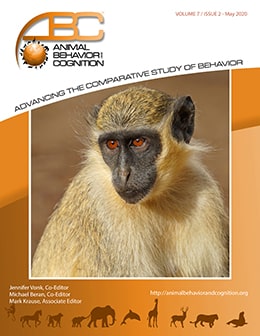Vol 7, Issue 2, May 2020
Discrimination of Black-Capped Chickadee (Poecile atricapillus) Chick-a-dee Calls Produced Across Seasons
Citation
Scully, E. N., Campbell, K. A., Congdon, J. V., & Sturdy, C. B. (2020). Discrimination of black-capped chickadee (Poecile atricapillus) chick-a-dee calls produced across seasons. Animal Behavior and Cognition, 7(2), 247-256. doi: https://doi.org/10.26451/abc.07.02.14.2020
Abstract
While black-capped chickadees (Poecile atricapillus) primarily produce fee-bee songs in spring, they produce chick-a-dee calls year-round with call production peaking in the fall. This call serves multiple functions, including food location, flock communication, and predator alarm. As seasons change, the meaning of the call may also change. For instance, flock communication could be more important in the fall than in the spring, and food type and availability change according to season. To determine if the chick-a-dee call varies acoustically across seasons in a predictable manner, we conducted an operant go/no-go discrimination task that examined black-capped chickadees’ ability to categorize calls produced in two different seasons: fall and spring. We found that birds trained to respond to vocalizations produced in either fall or spring learned to discriminate at the same rate as birds trained to respond to pseudorandomized stimuli, suggesting that none of the groups demonstrated category learning, relying instead on rote memorization. These results suggest that while chickadees can be trained to discriminate between chick-a-dee calls produced in different seasons, they do not discriminate these calls or perceive these calls as being members of natural, preexisting, perceptual categories, based on an underlying perceptual similarity.
Keywords
Acoustic discrimination, Black-capped chickadee, Operant conditioning, Season, Songbird
